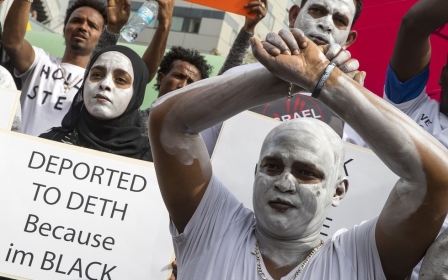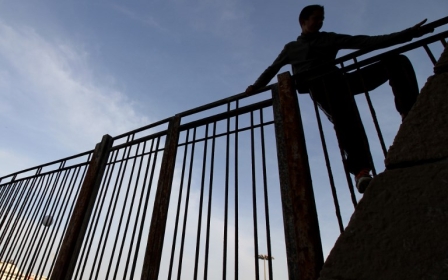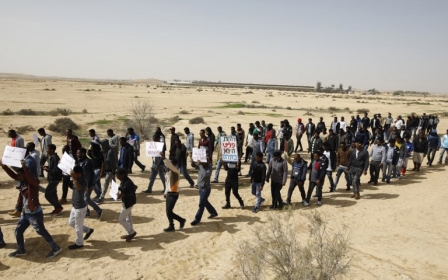Netanyahu places migrant asylum relocation agreement on hold
Israeli Prime Minister Benjamin Netanyahu said on Monday he was putting on hold an agreement with the UN refugee agency UNHCR to relocate thousands of African migrants to Western countries, in an embarrassing turnaround hours after its first announcement.
The deal was opposed by right-wingers, as it would give thousands of migrants the right to stay in the country, and two of the western countries named - Italy and Germany - said they had no knowledge of any such agreement.
Netanyahu posted a message on his Facebook page saying he was putting it on hold until further review.
Israel announced earlier on Monday that it had reached a deal with the UN refugee agency to cancel a highly contested plan to deport African migrants and replace it with a new one that will see thousands sent to Western countries.
"Israel and the UN High Commissioner for Refugees have reached unprecedented understandings for the departure of at least 16,250 migrants ... to Western nations," the Israeli statement said.
In a speech on Monday afternoon, Israeli Prime Minister Benjamin Netanyahu identified Canada, Germany, and Italy as some of the countries set to host the asylum seekers.
"The agreement stipulates that for each migrant who leaves the country, we commit to give temporary residence status to another," Netanyahu said.
Migrants not included in the new relocation plan, many of whom are seeking asylum, will be allowed to remain in Israel for at least the next five years, Netanyahu's office said in a statement.
A UNHCR spokeswoman confirmed that an agreement had been reached but gave no details.
A group of residents of southern Tel Aviv, where many of the migrants have settled, immediately denounced the new plan in a statement, calling it "a shame for the state of Israel," just as the Israeli government said a committee would be established to come up with a "rehabilitation plan" for southern Tel Aviv.
The announcement comes a day after the deadline imposed by the Israeli government in January, giving some 38,000 undocumented African migrants the choice between indefinite imprisonment with eventual forced expulsion, or a $3,500 payment and a plane ticket back to their home countries or to Rwanda and Uganda – with which Israel struck deals in 2017 and 2013 to accept migrants in exchange for modest sums of money.
The UNHCR had called on Israel to scrap its deportation plan, which targeted between 15,000 to 20,000 asylum seekers, calling it incoherent and unsafe.
Rights groups advocating on behalf of migrants had challenged the deportation plan in Israel's Supreme Court, which on 15 March issued a temporary order that froze its implementation.
An investigation by Hotline for Refugees and Migrants, an NGO based in Israel, found hundreds of African asylum seekers deported "willingly" from Israel had died in torture camps in Libya or drowned at sea.
According to interior ministry figures, there are currently some 42,000 African migrants in Israel, half of them children, women or men with families who are not facing immediate deportation.
More than 1,400 asylum seekers are being held in two detention centres, including the notorious Holot facility in the Negev desert which has continued to operate even after an Israeli Supreme Court ordered it to close over rights concerns in 2014.
Some migrants lived for years in Israel and work in low-paying jobs that many Israelis shun. Israel has granted asylum to fewer than one percent of those who have applied and has a years-long backlog of applicants.
Most arrived in Israel in the second half of the last decade, crossing from Egypt before the route was sealed. Israel uses the term "infiltrators" to describe people who did not enter the country through an official border crossing.
Many of the migrants say they came to Israel to seek asylum after fleeing persecution, conflict, and in the case of Eritreans, forced, lifelong conscription to its army, but Israeli authorities regard them as economic migrants.
A 2016 UN commission of inquiry into Eritrea's regime found "widespread and systematic" crimes against humanity, and said an estimated 5,000 people flee the country each month.
The International Criminal Court has indicted Sudanese President Omar al-Bashir on charges of war crimes, crimes against humanity and genocide linked to his regime's counter-insurgency tactics in the Darfur conflict.
The migrants' presence in Israel has become a political issue, with Netanyahu referring to them as "not refugees but illegal infiltrators," and blaming them for posing a threat to Israel’s social fabric and Jewish character.
A fence Israel has built over the past few years along its border with Egypt has all but stopped African migrants from entering the country illegally. Since 2005, prior to which the border had been porous, a total of 64,000 Africans had made it to Israel, although thousands have since left.
New MEE newsletter: Jerusalem Dispatch
Sign up to get the latest insights and analysis on Israel-Palestine, alongside Turkey Unpacked and other MEE newsletters
Middle East Eye delivers independent and unrivalled coverage and analysis of the Middle East, North Africa and beyond. To learn more about republishing this content and the associated fees, please fill out this form. More about MEE can be found here.




